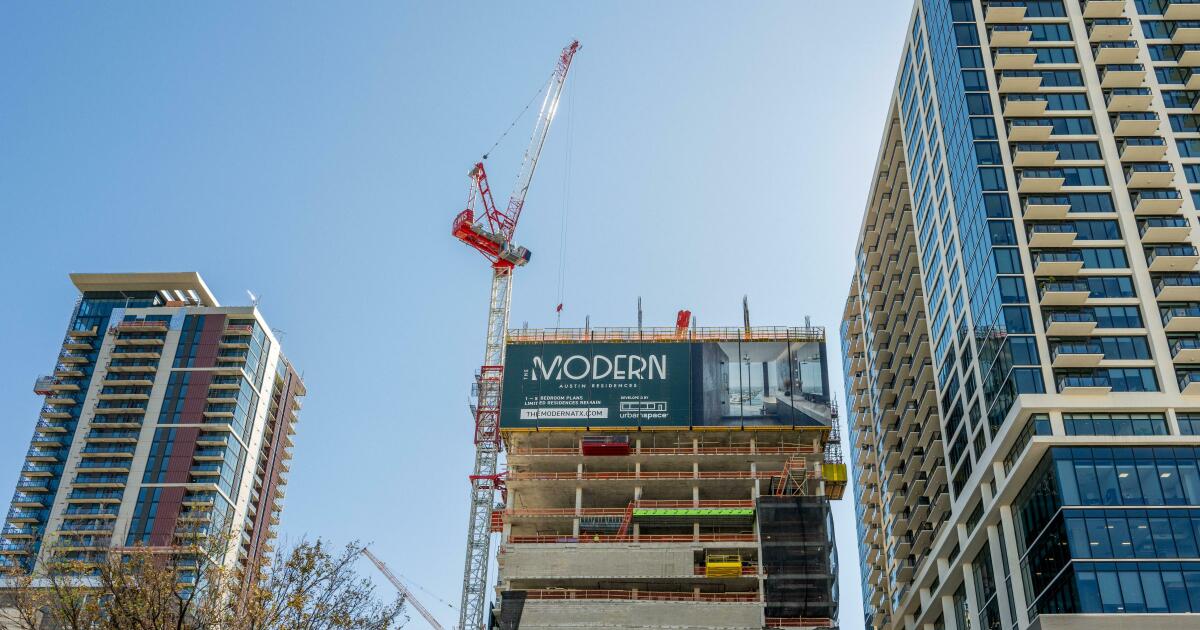The city council in Austin, Texas recently proposed something that could seem like political Kryptonite: getting rid of parking minimums.
Those are the rules that dictate how much off-street parking developers must provide — as in, a certain number of spaces for every apartment and business.
Around the country, cities are throwing out their own parking requirements – hoping to end up with less parking, more affordable housing, better transit, and walkable neighborhoods.



This sounds like it was pushed for by the development companies, not environmentalists. If this does anything except lower costs for businesses, I’ll eat my shoe.
A lot of local urbanist groups have been pushing for this for a long time. Parking minimums were largely made up by pulling numbers out of hats in the 50s and have essentially no basis in empirical fact. Countless small businesses all across the countries exist in buildings that could not legally be built today because of parking minimums. I remember a story from a small Arkansas town about some local entrepreneurs that wanted to open a cafe in a vacant downtown building, but couldn’t because they’d need to buy the adjacent building and bulldoze it to make a parking lot in order to meet parking minimums.
These also apply to residential buildings as well. If someone is wanting to build a medium sized apartment building in an older pre-war walkable area near a train station, but modern parking minimums require buying 3x the land in order to build a parking lot, that building isn’t going to happen, meaning that new housing units aren’t being built and thus there’ll be more price pressure on existing housing.
Not to mention, denser housing allows for fewer cars and more transit, which in an absolute boon for the environment. There’s a reason why suburbs emit way way more CO2 per capita that downtown areas.
I ran the numbers once; If a 1300 ft^2 house (~130 m^2) were classified as a business, it would require 4-5 parking spaces. The land used by parking ends up being equal to half the area of the building.
Environmentalists are very much in favor of getting rid of these parking minimums. The sprawling endless mega stores, impossible to walk between with massive parking lots that are never even close to filled but taking up valuable space all come from these policies. They were originally heavily pushed by auto makers on the basis of pretty much zero evidence. Less parking lots will create denser neighborhoods that are more walkable, bikeable, and improve both the efficiency and use of public transit. There will be more things nearby, lessening the need for cars or travel for simple errands to begin with. Many downtowns have been strangled by these requirements, becoming parking lot ghost towns that barely anyone lives in, killing local businesses in the end.
Here’s an environmentalist take on the issue if you don’t mind a video:
https://youtu.be/OUNXFHpUhu8?si=QlIPRBNk-nG7Ha5J
It’ll mean folks working or living at a lot of places won’t have a place to park, and without further investment into rail, bus, and bike infrastructure it means that a lot of folks simply won’t be able to work or live where they need to.
On paper, this means denser development all around. But living in most of these places requires owning a vehicle. That means you gotta have somewhere to put it. Otherwise, you’ve gotta provide alternate means for folks to get to where they need to go. Expanded bus service, more light rail, and better and more bike trails are essential.
deleted by creator
Does it increase walkability? Or does it just force residents to walk? Because those are not the same.
deleted by creator
But if there is no infrastructure to accomodate not driving, you havent made anything more walkable. Just less traversable.
Walkability isnt when cars are harder to use so you have to walk, its when a space is designed to make walking convenient. This doesnt seem to be doing anything but making one type of transport harder to use. Without making other options better, its just going to build resentment in people for losing a formerly preferred transport and being forced to use currently worse transport instead.
deleted by creator
deleted by creator
deleted by creator
deleted by creator
deleted by creator
If it gets rid of the minimums, I’m not complaining.
I think the bigger part is it lowers the barrier to entry for others.
There are spots where, if I wanted to build a 10 br apartment complex, I’d have to have a 20 space parking lot. That means I either need more land or more construction for a parking deck. Expand that out to 100/200 units and you can quickly see where this becomes a barrier.
Not to mention, this further necessitates parking because now my nearest neighbor is further away, which could have simply been a bar or grocery store.
Now I’m not someone that can afford to build something that big, but I wouldn’t be surprised to see new builders move into the market.